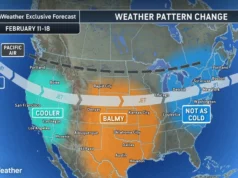
Experience is the best teacher, but not if school is canceled.
Stocks fell sharply Monday and again on Tuesday after President Trump said there was “no room left” for Canada or Mexico to avert steep tariffs and that existing ones on China would be increased. Hours later, the levies kicked in. The S&P 500 has now erased its year-to-date gains and is in negative territory.
Is the selloff an overreaction? The bull market kept rolling the last time Trump initiated a trade war in 2018 and 2019.
But investors might have faulty memories. Back then, landmark corporate tax cuts had just taken effect. They also included a provision allowing companies to use temporary bonus depreciation. Largely as a result, by late 2018, operating earnings and capital spending by S&P 500 companies were racing ahead at their fastest clip for almost any period aside from recoveries from a recession.
The profit and investment boom softened the blow from those less-sweeping tariffs. By late 2019, though, earnings momentum had run out, along with boardroom optimism. That December, the Institute for Supply Management’s manufacturing index fell to its lowest since the financial crisis.
What happened next? A recession and a bear market, but because of the Covid-19 emergency, not the trade war. With a slug of election-year stimulus, stocks might have muddled along. We’ll never know.
Monday, just hours before tariffs were confirmed, featured ISM’s report for February. This headline number wasn’t bad, yet the underlying details were: New orders fell sharply from the highest in years to contraction territory. Meanwhile, prices paid and deliveries surged. Together they suggest a rush to stock up in case of tariffs and a likely slowdown in building future inventory.
Disclaimer
The information contained in South Florida Reporter is for general information purposes only.
The South Florida Reporter assumes no responsibility for errors or omissions in the contents of the Service.
In no event shall the South Florida Reporter be liable for any special, direct, indirect, consequential, or incidental damages or any damages whatsoever, whether in an action of contract, negligence or other tort, arising out of or in connection with the use of the Service or the contents of the Service.
The Company reserves the right to make additions, deletions, or modifications to the contents of the Service at any time without prior notice.
The Company does not warrant that the Service is free of viruses or other harmful components












